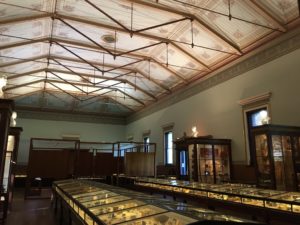Lean on me, when you’re not strong
And I’ll be your friend
I’ll help you carry on
For it won’t be long
‘Til I’m gonna need
Somebody to lean on
James and I learned that SLSA’s Mortlock Chamber has great acoustics. It made up a little for having been too tired for karaoke earlier in the week. A little free wine didn’t hurt, either.
A couple of months ago I went to Adelaide for the 9th New Librarians’ Symposium, along with loads of other cool library people. I gave two conference talks—my first and my second—on topics close to my heart. I learned so much from so many people. I had a pretty good time.
I also spent that weekend processing the news that my cousin, who a few days earlier had been critically injured in a motorcycle accident in Brisbane, was almost certainly going to die. We all hoped against hope for a different outcome. I felt terrible for enjoying myself so far away. Mum reassured me it was okay to keep doing my thing. I tried not to think about it. I didn’t tell anyone.
Tristan died of his injuries the following Wednesday, the day I got back to work. We weren’t close, but we were the same age, and he died without warning. I put off writing this post for several weeks because every time I thought about the conference I instead thought about my cousin dying, and I hoped that in time, the two events would separate in my memory. They haven’t quite, and I’m not sure they ever really will, but it feels like enough time has passed that I can write up a post, and do them both justice.
Here are some slightly disjointed reflections on NLS9, a truly inspiring conference. I just wish they weren’t the only things I remembered.
Please swallow your pride
If I have things you need to borrow
For no one can fill
Those of your needs
That you won’t let show
I did the thing! I swallowed my nerves, stood up in front of a packed room and said ‘We need to talk about cataloguing’. It was the conference talk I’d always wanted to give. A strident, blistering, passionate speech about the importance of library metadata and the people who make it happen. Several1 people2 later3 said4 it was the highlight5 of their weekend.6 I won’t lie—it was the highlight of mine, too.
I knew I would speak too fast and try to cram too much into my allotted twenty minutes, but I tried to compensate by being Really Enthusiastic. I knew this was my big chance to show a different side to cataloguing and metadata, a sector not known for its visibility or charisma, and perhaps encourage some of the audience to get involved in this work. I also coined the phrase ‘evidence-based whinging’ and I’m really hoping someone uses it soon!
Believing that citation should be feminist praxis, I took enormous pleasure in quoting my library heroes, bringing their work to a new audience. I have been deeply influenced by critical and radical library thinkers, both abroad and at home (though mostly abroad, it must be said), whose writings and actions make our sector a better place. I hope one day to be half as good a librarian as they each have been. For the moment, I’ll settle for quoting them adoringly in conference talks.
Thank you, audience and tweeters and delayed talk-readers, for supporting me. It certainly felt like I made a good impression. 🙂
People really like zines, I guess. Approximately ninety minutes later, noted zine boss Kassi Grace and I co-presented ‘Photocopying the revolution’, about librarians making zines and changing the world. Kassi talked about zine history and incorporating zinemaking into her professional practice. I talked about how libraries collect, catalogue and preserve zines.
While I read my cataloguing talk mostly word-for-word, with the zine talk I tried out a slightly looser approach, with a few ad-libs. I don’t think this style works for me—my brain seems to like full sentences on a page, and I don’t make the best jokes when I’m nervous. Kassi was awesome, though, and the talk seemed quite well-received. We threw in a plug for our collaborative conference zine at the end (I say ‘our’, it was Kassi’s idea, she did all the work), which turned out to be a great memento of the event.
Giving two talks at one conference was a lot of work. More than I anticipated, I think. They both came out okay, but next time I’ll stick to one talk per conference. And I’ll finish writing it more than 24 hours in advance.

Libraries are for people, not for machines. I later realised that the presentations I remembered best had followed an implicit theme of human-centred library practice: James Nicholson’s polemic on ridding the world of library fines and Nikki Andersen’s deeply inspiring call for radical inclusion and empathy in libraries were particular highlights. In addition, keynotes Sarah Brown and Eva Balan-Vnuk spoke of our technology-augmented present and future, which already excludes and marginalises by design. Though I don’t think it was mentioned by name, all these talks incorporated elements of design thinking, which seeks to make the library work for people, not the other way around.
It really was wonderful to see so many speakers implicitly, and independently, come to the same conclusion: our libraries are not about performance metrics, they are not about perfect data, they are not about profits. Libraries are about people. Let’s make them welcome.
Talking about a revolution no longer feels like a whisper. NLS9 felt like a critical mass of new, progressive, energised library workers who were ready to Get Shit Done. I said as much in my zine page, which I scribbled out at work three days later because it was my zine and I could do that (though given everything else I had going on, it was absolutely the last thing I felt like writing). I wrote of finding my people, and though I mostly hung around (and fangirled at) those I already knew, I had the pleasure of meeting new people and making new friends. It’s hard to keep that momentum going, though, once we’ve all dispersed back to our respective workplaces. Twitter helps a little, but I wonder if there are other ways to connect and organise between conferences.
I also learned that eggnog-flavoured milk is a thing in South Australia, that Flic French and I missed our true calling as Hollywood scriptwriters (look, I’d watch a show about someone using AACR2 as a grimoire), and that Kyla Stephan spins an excellent yarn. Ask her what she did on her birthday this year (though perhaps not at work!).
Sustainability or bust. Like many other attendees, I was deeply impressed by the conference’s environmental consciousness. Co-convenor Pixie Stardust’s zeal for sustainability and low-impact conferencing hit me right in the feels. It felt like they thought of absolutely everything—reusable crockery, no plastic packaging, like… six different kinds of rubbish / compost / recycling bins, plant-based catering, local suppliers, you name it. That cannot have been simple to organise, and yet they pulled it off. Even the leftover pizza was donated to local shelters. It was a powerful demonstration that yes, it can be done, and it set a standard for all conferences to follow.
Unlike many other attendees, I did not fly to NLS9. Taking the train from Canberra to Adelaide (via Melbourne) is a four-day round-trip, but considering my penchant for slower and less carbon-intensive travel, plus my desire to ride the Overland before it possibly closes for good, it was time very well spent. I live-tweeted the Melbourne to Adelaide leg and discovered Michael Barry also had the same idea!
While in Adelaide I continued to ferment some thoughts I’ve been having all year about environmental theories of knowledge. I visited the incredible Museum of Economic Botany (now sponsored by a mining company, natch), a treasure trove of ethnobotanical knowledge. I thought about how many thousands of years it would have taken humanity to gain that knowledge. Here it all sat, in an old wooden hall, that I could wander around in for free. I found myself wishing it were all contained neatly in a book. I tried to work past my knowledge biases. How did we come to know all these things? Why don’t we all value this knowledge?

Jacinta Koolmatrie’s keynote, ‘Libraries and land’, brought the point home to many of us. For Aboriginal people, and for her people, the Adnyamathanha and Ngarrindjeri nations, the land is their library. By destroying the land, we, settlers, are destroying their library, their sources and repositories of knowledge. Aboriginal people didn’t need libraries until the colonists showed up. Ours is not the only method of preserving knowledge, nor is it necessarily the best method. I would like to see more critical (self-)reflection on this in future conference talks.
I know I learned more, saw more, reflected on more during this conference. It was wonderful. But it was also tinged with sorrow. For the longest time part of it felt like it wasn’t my story to tell. Perhaps I could eventually have talked about NLS9 without including those details. But it wouldn’t have been the whole story. And after all, that’s what we’re about as librarians, right? We’re not just storytellers, but storykeepers.
Sometimes in our lives, we all have pain
We all have sorrow
But if we are wise
We know that there’s always tomorrow
- Liz’s wrapup: ‘Absolute highlight of the conference proper’ ↩
- Nikki’s wrapup: ‘[O]ne of the most memorable and inspiring presentations for me’ ↩
- Sarah’s wrapup: ‘[P]ossibly the most directly relevant to my everyday work in acquisitions and cataloguing’ ↩
- Brendan’s wrapup: ‘After Alissa’s talk I was ready to dash to a computer and start passionately editing MARC records’ ↩
- Rebecca’s wrapup in InCite: ‘Alissa McCulloch was a big surprise and got me to care about metadata – the mere term had hitherto prompted my eyes to glaze over’ ↩
- I don’t care if it’s gauche to collect nice things my peers say about me and my work. This means more to me than any performance review. ↩